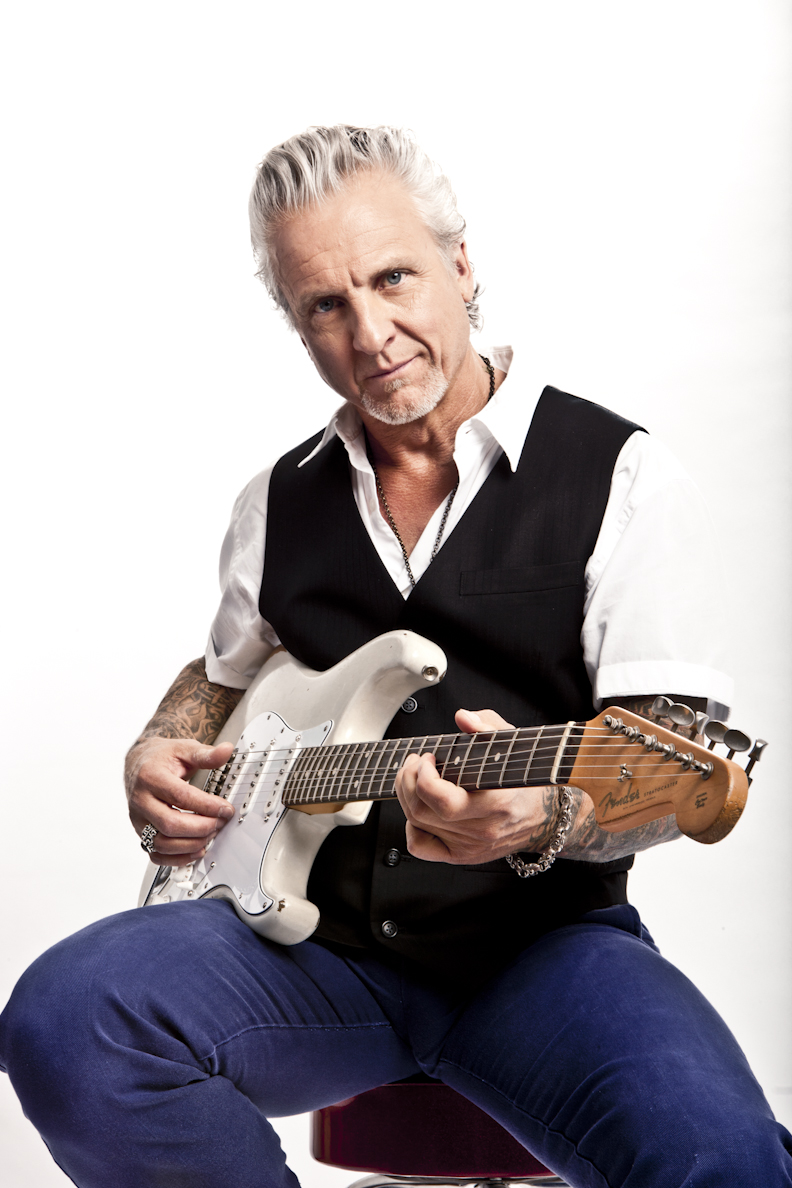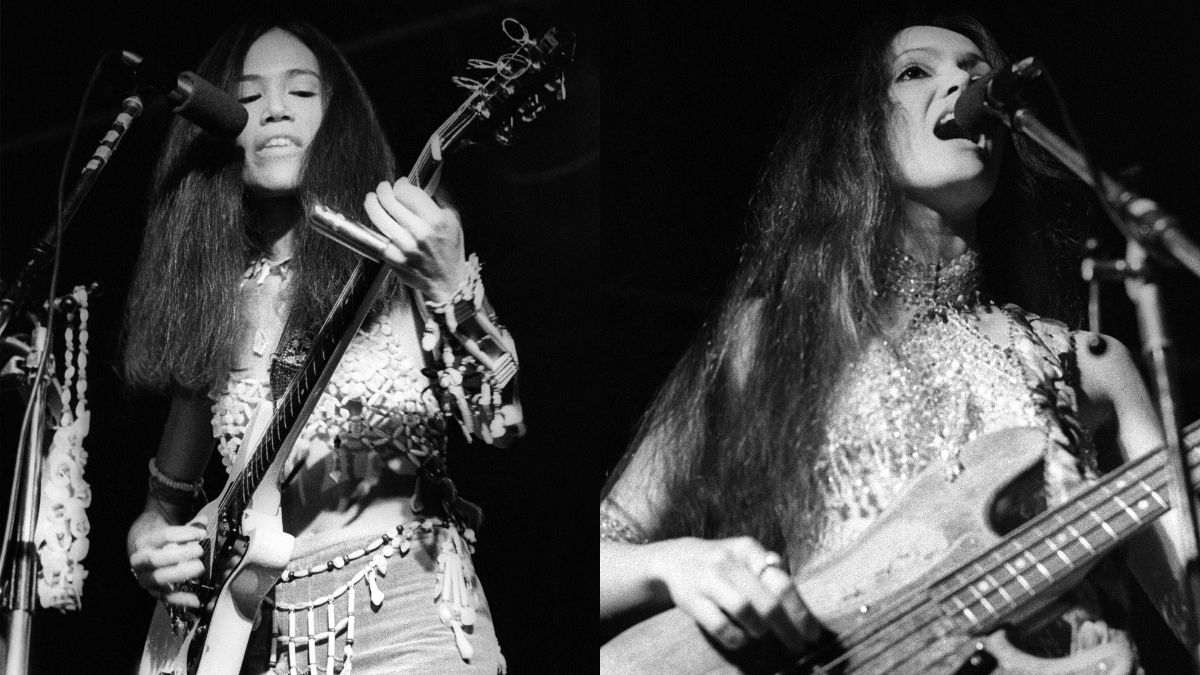Dear Guitar Hero: Neil Giraldo Talks B.C. Rich Eagles, "Jessie's Girl," Jeff Beck, Producing and More
All the latest guitar news, interviews, lessons, reviews, deals and more, direct to your inbox!
You are now subscribed
Your newsletter sign-up was successful

He’s married to Pat Benatar and has played guitar on every one of her records, but what Guitar World readers really want to know is …
Pat Benatar’s “You Better Run” was the second music video ever played on MTV. What do you remember about making it? — Ken Bower
With MTV, music went from being just an audio form of communication to a visual one too, which was great. The problem was, you could have a great hairdo—and I had a perfect greaser cut when we started shooting “You Better Run”—but it took nine hours to shoot that thing. By the time we were done my hair had frizzed out! [laughs] Another cool thing is that someone pointed out to me years later that I was the first guitar player on MTV. There was no real guitar in the previous song [The Buggles’ “Video Killed the Radio Star”]. I had no idea about that until someone mentioned it to me.
Who has been your biggest influence on guitar? — Michael Felton
Jeff Beck, purely for how he attacks the instrument. With Beck, it’s not so much the notes he plays but the impact they have. I picked up on him early on because I loved his work with the Yardbirds. He really dug in. Eric Clapton was smooth and sweet—fine, I got it. But I never really went for it. Jeff was the guy.
In the Eighties you came up with some great hard-rock riffs and leads. But you were never part of the whole guitar-god thing that dominated that era of rock. How did you feel about that? — Thom Stephenson
I didn’t mind it at all, because I always viewed myself as more of a songwriter I use the guitar as a tool to create. Also, I wasn’t a dweedler—my hands didn’t move like that—and I didn’t use Marshall stacks. I liked 2x12s. I guess I also didn’t fit into the hair-band thing because my hair didn’t look good long. I always wore it short.
All the latest guitar news, interviews, lessons, reviews, deals and more, direct to your inbox!
Your main guitar back in the day was a B.C. Rich Eagle. How did you come to play that model? — Sid Ramos
In 1977, I joined Rick Derringer’s band and I was playing a red Gibson SG. Rick had a [B.C. Rich] Mockingbird, and the first thing he said to me was, “You’re in the band, but you gotta get a new guitar. You can’t play that SG.” Then he said, “I’ll get you a B.C. Rich, but you can’t play a Mockingbird, because I play one.” So I said, “Okay, I’ll have an Eagle.” And [B.C. Rich founder] Bernie Rico fixed me up with a couple of them. And now B.C. Rich has a Neil Giraldo Eagle model. We have a new one coming out next year called Kato 13.
What was your setup on those classic Pat Benatar records like Crimes of Passion? — Andrew Benton
For amps, I used Marshall 2x12 100-watt combos, which are pretty rare. They were 1979 JMPs. When we did the US Festival I needed more of them, so I contacted Jim Marshall, and he said, “First of all, nobody wants those things. They’re impractical. They’re too heavy.” But he told me had four left. He said, “You want ’em?” And I said, “Sure!” My usual setup was two 2x12s running in stereo, and I used an [Eventide] H949 Harmonizer as a gain input to drive the front end. Guitar-wise I had the Eagles, though on the first record [1979’s In the Heat of the Night] I used Strats and Teles, too.
I never knew until recently that you played the solo on Rick Springfield’s 1981 hit “Jessie’s Girl.” It’s awesome! How did that come about? — Marissa Fitzpatrick
Actually, I did all the guitars on “Jessie’s Girl,” and the bass, too. [Producer] Keith Olsen was working with Rick at the time and he wanted me to co-produce and arrange the record with him. Rick had a demo for “Jessie’s Girl,” and it was a very good demo, but he had some strange kind of instrumental bridge that was awkward to the song. So I said, “When we get to that section, why don’t we just give it 16 measures and I’ll put a solo in?” We actually cut the drums and rhythm guitars first, and then I put on the bass and the lead guitar. Then Rick sang it, and that was it. And it’s the only Number One record I’ve ever had!
What was it like playing the US Festival in 1982? — Phil Wallace
One thing that sticks out about it was that Bill Graham, who was the promoter, was a real nice guy but he could get really angry with people. I remember the Kinks were supposed to play before us, and it started getting later and later and they hadn’t shown up. Finally, Ray Davies comes walking in and Bill just rips him to pieces. He’s cursing at him, yelling, “How dare you! How dare you! You get onstage right now!” I thought he was gonna kill him! Then he turns around to me and says [in soft voice] “Oh, hey Neil. You okay? Can I get you anything to drink?” It was crazy. [laughs] I also remember that for our encore we did a song called “Fight It Out,” which is a pretty obscure tune in our catalog, especially to play to such a big crowd. But back then I was so brave. I would do anything. And it worked out great.
Do you have a proudest guitar moment? — Roland Gack
I’ve always liked [Pat Benatar’s] “Hell Is for Children.” I wanted to make that song an epic type of thing, with a lot of transitional parts. And I was really proud of the outcome. It starts off solemn and it ends solemn, but it goes through a whole line of emotions in between.
Is it tough being in a band with your spouse? — Daniel Rosen
It is, but there’s a mutual respect. Pat and I are partners and we’ve always been partners. It was never like I was a “guitar for hire.” I came in as a partner and we built the band from the ground up.
Your leads have always been really melodic and almost singable. Do you work them out in advance? — Timothy Brookes
The only thing that was ever really worked out was the first note. Because what I would try to do is take the same note that the vocal ended on and build the solo from that. From there, I would just go for something that would keep the listener’s interest as much as the vocal did. I never thought of a solo as a moment for guitar self-indulgence.
Are there any new guitarists you really like? — David Schmidt
I like Jack White a lot. He’s right at the top of the list. I love the ferocious attack that he has. He may not hit all those notes, and some of them may be out of tune when he does, but he just goes after them. He has his own sound. Plus, he’s a song guy. He represents everything that’s right about playing guitar, writing songs and being in a rock and roll band.
In addition to your work with Pat, you’ve produced a lot of other artists. Do you have any favorite producing experiences? — Marc Weisman
I’ve worked with a lot of people, like John Waite and Steve Forbert. But one of my favorites would have to be the two records I did for the Del-Lords. [Guitarist and founder] Scott Kempner is a good friend of mine and they were a great band. We still write songs together all the time. As a matter of fact, right now we’re working on a Christmas record. I’m producing it like a Phil Spector–type of thing, using different artists to sing and play on it. And they’re strange songs. They’re about helplessness, hopelessness, heartache. Fucked-up shit. Not the usual holiday stuff. It’ll be a good Christmas record.
Was it ever weird knowing that there were dudes in the audience who were lusting after your wife? — Patrick Lightner
No, because I was lusting after all of their girlfriends!
Rich is the co-author of the best-selling Nöthin' But a Good Time: The Uncensored History of the '80s Hard Rock Explosion. He is also a recording and performing musician, and a former editor of Guitar World magazine and executive editor of Guitar Aficionado magazine. He has authored several additional books, among them Kurt Cobain: Montage of Heck, the companion to the documentary of the same name.

